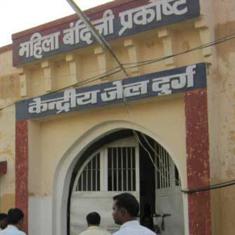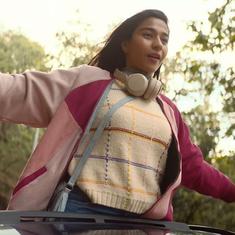Shahzar Rizvi maintains a notebook where he jots down everything he needs to do in practice the following day: which are the areas he needs to work upon, and how he has fared in each of his national and international competitions. He will note down everything but the scores. That is a distraction.
He uses this as a tool to visualise what happens at the shooting range and how he will shoot 250-300 pellets daily, an exercise taught to him by India’s national pistol coach Pavel Smirnov. How he does in practice, is how he performs in competition, according to the 23-year-old shooter from Meerut.
“Mere ek funda hain, jo practice main karta hoon, wahi main competition mein karne ko dekhta hoon. (Whatever I do in practice, I try to do the same in competitions as well). That why there is no pressure on me,” Rizvi said.
And this meticulous training seems to have served well, with his remarkable performance in the past couple of months which culminated in him becoming the world No 1 in 10m air pistol on May 1 following a gold and silver in the ISSF World Cup this year.
In November last year, he won gold at the Commonwealth Shooting Championship in Australia.
#ShahzarRizvi wins #GOLD medal in 10m Air Pistol event at #Commonwealth #Shooting Championships. Kudos! More power & success to you!#SAI 🇮🇳🥇 pic.twitter.com/OyNp3cnzYt
— SAIMedia (@Media_SAI) November 1, 2017
In December, he was part of the gold-medal winning team at the Asian Airgun Championship even as he lost the bronze by 0.3 points in the individual event.
At the turn of the year, he beat a field of 568, including the likes of Jitu Rai, at the National Shooting Championship to win the gold with a new national record.
But the best was yet to come.
Competing in his first senior World Cup, Rizvi shot a world record score of 242.3 in the final at the ISSF World Cup in Mexico to win the gold in a field containing an Olympic champion.
Shahzar Rizvi 🇮🇳 won gold in his first World Cup appearance, also adding a new World Record in the men's 10m Air Pistol final.https://t.co/GyCxy4x8V6 #ISSFWC pic.twitter.com/vhsjPlZhyP
— ISSF (@ISSF_Shooting) March 3, 2018
He followed it with silver at the second World Cup of the year in Korea, where he was the only Indian to win any medal.
But congratulate him on a terrific season, and the first response is that he missed a second consecutive gold by just a margin of 0.2 points. “The performance was not so good in Korea so I was a little disappointed, but I will make up for it in Germany,” he said.
CWG miss a blessing in disguise
The only blip in this illustrious list is the Commonwealth Games in April, where he wasn’t part of the squad. With a reduced number of slots, the Indian shooting federation went with shooters who competed in both 10m air pistol and 50m pistol events.
But in a way, that also turned out to be a lucky break for Rizvi. He was fresh for the second World Cup and shot a good score at the same range where the 2020 Olympic qualification spots will be up for grabs during the ISSF World Championship later this year.
“Right before the selection for the Commonwealth Games, Ronak sir [Pandit, his coach since 2017] and I had decided that we won’t go to Mexico because we would have to leave for Gold Coast soon as we returned.
“But then it was good in the end that I didn’t go. A gold there would have brought some financial help, but the World Cup is a much bigger event. My silver in Changwon came at 239.8. while Jitu [Rai] got the gold there in 235.1. And world No 1 is bigger than CWG gold” he explained.
Jitu Rai is one of India’s biggest names in pistol shooting. But the youngster says he is also the person he has beaten the most in the last four years. This may sound conceited to some, but given his performances, it is a sign of confidence from the young man who has always been more interested in shooting than academics.
From Meerut to Air Force, all for shooting
Like many Indians, Rizvi’s family also wanted their son to focus on academics and not become a sportsperson.
“Bachpan se hi shauk tha shooting ka (I was interested in shooting from the time I was a child). My cousin brothers – Rayyan and Sahul Rizvi – are both double trap shooters.
“My father was against it at the start and told me to focus on my studies, but I persisted because this is what I wanted to do. I couldn’t do double trap but then I was put into air pistol by my father. He thought that since he is so interested let him try it, he will eventually get tired of it in two or three months,” Rizvi recounted.
But within a year, he got into the Indian youth team and, in 2014, went to Spain for the Junior World Championships. He was coached by Amol Pratap Singh from the Sports Authority of India.
“After that I joined the Air Force. Shooting is an expensive sport and my family couldn’t afford it so I joined the force to be able to continue the sport,” he added.
Congratulations #AirWarrior Sgt Shahzar Rizvi for becoming TOP Shooter in Men’s World Ranking for 10M Air Pistol Event. #Rizvi on 01 May 18 grabbed the No.1 spot in #ISSF World Rankings.
— Indian Air Force (@IAF_MCC) May 2, 2018
More on https://t.co/RbQLW8NeBp pic.twitter.com/ge6vHVbbmt
Currently, he works with Ronak Pandit, and the former international has played a significant role in Rizvi’s recent success.
They worked on his technique and helped deal with his breathing problems while shooting, and he has benefited from having a physio and a mental trainer as well.
“In 2017, I trained with him for six months. At that point, I had no sponsors. Towards the end of the year I got the support of Olympic Gold Quest. The Sports Authority of India and the Air Force is helping me as well,” the shooter, who was included in the Target Olympic Podium Scheme last week, said.
All credit to my coach/guru @CoachRonak sir for honing my skills over past year, working very hard with me and most importantly filling positive energy and attitude of "CAN DO" in me and the results speaks itself. 🙏
— Shahzar Rizvi (@RizviShahzar) April 26, 2018
‘Gold mera hain’
At 23, Rizvi appears to know a lot not just about his game, but also about the factors around it and his competitors. He is aware of where his follow-through lacks and believes in the power of self-talk as well. Most importantly, he sees shooting as a “100% mental sport.”
That is why his WhatsApp status reads “2020 Olympics Gold mera hain (The Olympics gold in 2020 is mine).”
His most immediate goal is later this year – the ISSF World Championship in Changwon, which is also the first event to secure a quota place for the Tokyo 2020 Olympics. Then, there is the Asian Games, where he will hope to get the elusive multi-sport event medal.
With his handy notebook and self-confidence, Rizvi is a shooter to watch out for.










